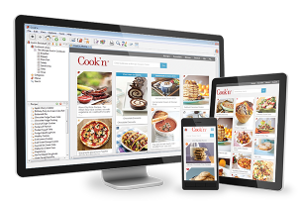
Birds and reptiles lay eggs. But, the eggs we use in cooking are usually chicken eggs.
Eggs contain complete protein because they give us all of the eight essential amino acids in the right amounts that our bodies need. The egg white supplies over ½ of the protein, the potassium and the riboflavin. The egg yolk gives us vitamins A and D, all of the fat and cholesterol, and most of the vitamins, minerals, and calories. Infants under one year of age should never be fed egg whites because they cause allergic reactions in many children that age.
Cook's Note: Before buying eggs, check to make sure the shells aren't cracked. Look on the side of the carton for the expiration date and choose refrigerated eggs that will stay fresh longer.
You can test an egg's freshness by dunking it in cold water. Fresh eggs sink to the bottom, while older eggs float. The older an egg is the bigger its air chamber grows. A large air chamber is what causes old eggs to float.
This Eggs recipe is from the Food Facts and History Cookbook. Download this Cookbook today.